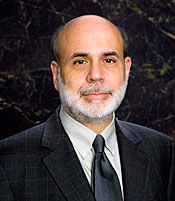Who is this Fed? And why is he always messing with my money?
In my last post we took a look at an interesting set of relationships that ultimately led to financial crisis. Each party (investors, homeowners, lenders, etc.) shares some portion of the blame. The system ultimately proved to be on an unstable foundation that crumbled when it came under duress.
Where Do we Look For Help!?
As the pieces began to crumble, residents from Main St to Wall St looked toward the government to help the economy pick up the pieces. The government weighs in on the economy in two ways: Fiscal Policy and Monetary Policy.
Fiscal Policy is what the elected officials of our government put into place. From the budget to the recovery act enacted under the current presidency, this is known as Fiscal Policy.
Monetary Policy, on the other hand, is what we are going to discuss, as it relates to the Federal Reserve, or more simply known, the Fed. Mr Ben Bernanke (pictured above, source: federalreserve.gov), is head of the Fed, and a very important man in the world.
Can the Federal Reserve Really Save the Day?
The Federal Reserve was created before World War I as a federal body that was able to deal with economic crisis. The Fed has several tools at its disposal to spur or rein in the economy.
Benchmark Interest Rate
First, the Fed sets the benchmark interest rate, known as the discount rate. This is the rate that banks are charged to borrow from the Fed. The lower the rate, the cheaper it is to loan money, creating more money on Wall St. and Main St. This may seem complicated, but it’s really not too bad. When rates are low, everybody wants to borrow money, cause it’s cheap. When rates are high, people tend not to borrow money.
With that principle in mind its a bit easier to understand how the Fed can help a struggling economy by lowering rates or stop inflation by raising rates (we’ll cover inflation soon). This is applicable to Main St residents, as bank rates track this discount rate. So how expensive a mortgage is is dependent on our friends at the Fed.
Reserve Requirements
Next, the Fed sets reserve requirements, meaning how much money banks have to have on hand. If the banks are required to have lots of money of hand, they cannot lend as much, creating less spending (less homes and cars purchased). If the requirement is low, the opposite is true.
The Fed & Their Bonds
Finally, the Fed is in control of government bonds and notes. When the Fed is selling bonds, the Fed is taking money out of the economy (slowing it down, controlling inflation). When the Fed is buying back bonds (as is going on now), the Fed is putting money back into investors hands and spurring the economy on.
How Hollywood Got “The Fed” Right
In one of the more dramatic, yet lesser understood scenes in the classic movie Wall Street, the leaders of the largest and most powerful banks gather together with the leader of the Fed to discuss what to do next. Ultimately, the Fed is forced, by fear of absolute failure, to fund and assume all the risk of a hostile takeover of one of the failing banks in the room.
This scene is essentially the Hollywood version of the bank bailout, known as the Troubled Asset Relief Program, or TARP (something for another post). This is an example of the Fed acting and influencing the economy and ultimately the residents of Main St.
Why The Fed Matters to People on Main St.
So while many on Main St often do not understand or know much about the Fed, the Fed has a strong influence in everyone’s economic life. Pay attention to what the Fed is doing. Are they buying or selling bonds? Are they lowering or raising interest rates? Are they bailing out Banks? Each of their actions is a signal to Americans with the things they can/should be doing with their money.
Residents of Main St that watch the Fed will better understand what’s going on and what they should be doing (refinancing mortgages, saving money, spending money, etc.).
About Andrew
Andrew is a corporate finance consultant living in Los Angeles, specializing in distressed and bankrupt consulting. He helps clients review business plans and the general market and decide what steps to take next. He has a masters in finance. Andrew enjoys running and biking in the San Gabriel mountains, cheering for the San Francisco Giants and eating (but trying not to gain weight).









